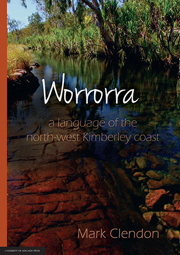Book contents
- Frontmatter
- Dedication
- Contents
- List of tables
- List of figures
- Abbreviations
- Acknowledgements
- Chapter One introduction
- Chapter Two segmental phonology
- Chapter Three morphophonology
- Chapter Four nouns and noun classes
- Chapter Five indicative mood and basic verbal morphology
- Chapter Six adjectives and inalienable nouns
- Chapter Seven pronouns, demonstratives, anaphors, deictics
- Chapter Eight optative, counterfactual and exercitive moods
- Chapter Nine number
- Chapter Ten adverbs and postpositional phrases
- Chapter Eleven complex predicates
- Chapter Twelve experiencer constructions
- Chapter Thirteen objects and possession
- Chapter Fourteen complement clauses
- Chapter Fifteen subjunctive verbs
- Chapter Sixteen middle voice
- Chapter Seventeen discourse cohesion
- Chapter Eighteen kinship terms
- Appendices
- References
Chapter Ten - adverbs and postpositional phrases
Published online by Cambridge University Press: 05 October 2014
- Frontmatter
- Dedication
- Contents
- List of tables
- List of figures
- Abbreviations
- Acknowledgements
- Chapter One introduction
- Chapter Two segmental phonology
- Chapter Three morphophonology
- Chapter Four nouns and noun classes
- Chapter Five indicative mood and basic verbal morphology
- Chapter Six adjectives and inalienable nouns
- Chapter Seven pronouns, demonstratives, anaphors, deictics
- Chapter Eight optative, counterfactual and exercitive moods
- Chapter Nine number
- Chapter Ten adverbs and postpositional phrases
- Chapter Eleven complex predicates
- Chapter Twelve experiencer constructions
- Chapter Thirteen objects and possession
- Chapter Fourteen complement clauses
- Chapter Fifteen subjunctive verbs
- Chapter Sixteen middle voice
- Chapter Seventeen discourse cohesion
- Chapter Eighteen kinship terms
- Appendices
- References
Summary
Adverbs in Worrorra modify predicates at nuclear, core and peripheral levels. Nuclear- and peripheral-level adverbs are discussed in §10.1, while core-level or modal adverbs are discussed in §10.2. In addition, §10.3 looks at some demonstrative adverbs used to locate events in space, §10.4 at some adverbs used to locate events at specific times, and §10.5 at a couple of interrogative adverbs. §10.6 will survey a number of very frequently encountered suffixes and postpositions attached to nouns, that form phrases or phrasal words functioning as de-nominal adverbs.
A number of important adverbs are enclitic on preceding material. A small number of aspectual morphemes are encliticized to preverbs, with scope over a complex predicate: these are -mirri ‘quickly,’ -je, -ji ‘again,’ and -biji ‘repeatedly’ (§10.1.1 (iii)). Of these, -mirri attaches only to preverbs, and -je and -biji attach to both preverbs and finite verbs. Sentence examples showing the use of -je/-ji may be seen at (10.15a, 10.61c) and (15.10f), and those showing the use of -mirri may be seen at (8.26b) and (8.28b). The clause-linking morpheme -maade ‘so, result’ (§8.2.4) is found after preverbs and also after nouns, deictics, adjectives in preverbal position, and most frequently after finite verbs. The enclitics -nyini ‘endpoint, until’ (§10.1.2 (v)), and -nyale ‘next in sequence’ (§10.6.4 (i)) appear to be unrestricted in their distribution, attaching to members of nearly every lexical category.
- Type
- Chapter
- Information
- WorrorraALanguage of the North-West Kimberley Coast, pp. 237 - 272Publisher: The University of Adelaide PressPrint publication year: 2014



